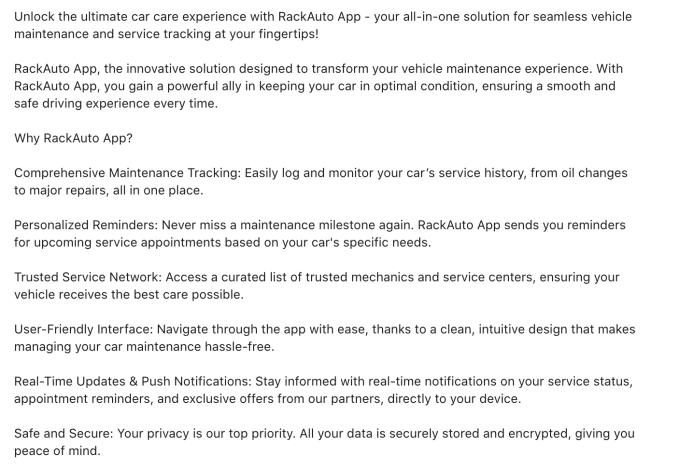Apple’s App Store may not always be as reliable as the company claims. One recent example involves RockAuto, a popular auto parts dealer among DIY enthusiasts, who are upset that a fake app posing as their official one has not been removed from the App Store despite numerous complaints.
RockAuto’s co-founder and president, Jim Taylor, first became aware of the issue when customers started reporting “annoying ads” in the non-existent app. This discovery was surprising given that RockAuto does not have an official app.
Fake RockAuto app on the App Store. Image Credits: Apple (screen capture by TechCrunch)
Upon investigation, the fake app displayed clear signs of being illegitimate, with misspellings and inconsistent graphics. It falsely claims to prioritize customer privacy and data security.
This situation not only deceives RockAuto’s customers but also challenges Apple’s claims about the safety and trustworthiness of the App Store, a platform that demands a share of developers’ revenue. It raises concerns about Apple’s ability to protect users from fraudulent activities within its own marketplace.

Image Credits: Fake RockAuto app on the App Store. Image Credits: Apple (screen capture by TechCrunch)
Despite RockAuto’s efforts to address the issue with Apple through official channels, the tech giant has yet to respond or remove the fake app.
RockAuto’s experience parallels a similar incident involving LastPass, where a fake app mimicking the password manager was allowed to remain on the App Store until public outcry forced its removal.
Apple’s lack of response to RockAuto’s complaints, despite following the proper procedures, reflects a concerning pattern of neglect towards fraudulent activities within the App Store.
As of the publication date, the fake RockAuto app is still live on the App Store, highlighting the need for better scrutiny and action from Apple to protect users and legitimate businesses.


